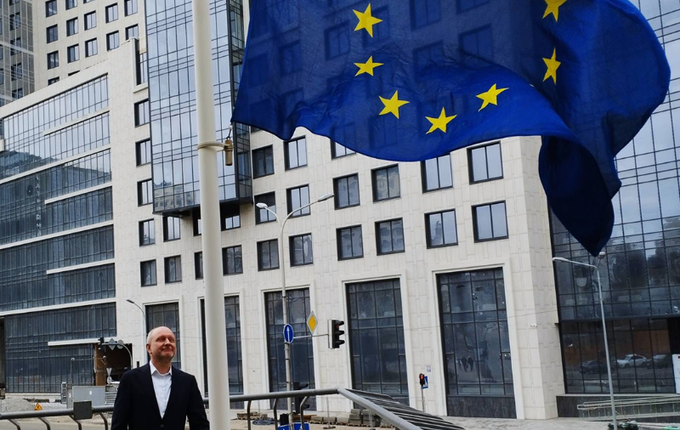The Commission adopted today its Partnership Agreement with Germany, laying down Germany’s investment strategy for more than €20 billion in cohesion funding for the period 2021-2027. The cohesion funds will continue to support German regions in promoting economic, social and territorial cohesion, supporting key EU priorities such as the green and digital transition. The funds will contribute to the country’s competitive, innovative and sustainable growth.
The Partnership Agreement covers 3 cohesion policy funds: the European Regional and Development Fund – ERDF; the European Social Fund Plus – ESF+; the Just Transition Fund – JTF; as well as the European Maritime Fisheries and Aquaculture Fund – EMFAF.
The Partnership Agreement with Germany paves the way for 52 operational programmes to start implementation on the ground: 31 regional, 2 national and 19 INTERREG programmes. Each of the 16 federal states (“Bundesland”) in Germany manages a separate ERDF and ESF+ programme, with the exception of Lower Saxony, which has opted for a combined ERDF/ESF+ programme. Moreover, two programmes will be implemented at the federal level: the EMFAF programme and a separate nation-wide ESF+ programme.
The new Partnership Agreement also covers the eligibility and implementation of the JTF in the regions which are most negatively impacted by the climate transition.
Finally, the Partnership Agreement reflects Germany’s strong commitment to the coordinated use of the cohesion policy funds with the Recovery and Resilience Facility.
A greener economy
Priority will be given to strategic investments in energy efficiency and the reduction of carbon emissions to achieve climate neutrality in Germany by 2045. Support will also go towards climate change adaptation, including funding for flood protection, urban mobility initiatives, environmental protection and pollution reduction. Finally, almost 6% of the ERDF will contribute to the protection of biodiversity. Germany intends to use over half of its EMFAF budget to support environmental objectives.
More research and innovation
Germany has planned to dedicate 30% of its investments from the Partnership Agreement to support research and innovation in enterprises, digitalisation, increased competitiveness and smart specialisation.
More social cohesion
Germany will strongly promote social cohesion, with more than 30% of overall funds being allocated to this goal. In particular, the ESF+ will support inclusive and high-quality vocational education and training, including apprenticeships, as well as lifelong learning. It will also support the development of socially inclusive services, such as improving the employability of disadvantaged groups and creating assisting services for older people like care and companionship services. Moreover, the funds will help the workforce and businesses in growing more resilient by supporting investments in upskilling and reskilling to create a climate-neutral, more digital and inclusive society. Particular attention will be given to measures in the field of social inclusion, for example combatting child poverty and the integration of migrants and refugees, including those fleeing the Russia’s invasion of Ukraine.
Involving local citizens in developing projects on the ground
5% of investments will be dedicated to territorial development instruments, aimed at developing integrated territorial strategies, especially in urban areas. In particular, the Land Saxony-Anhalt is engaging local action groups to design and deliver strategies, decision-making and resource allocation and thereby strengthen deprived rural and urban areas. Ten German Länder will support “Fisheries Local Action Groups” within the EMFAF programme, which will support the resilience and local initiative of coastal and inland communities dependent on fisheries and aquaculture.
Members of the College said:
Commissioner for Cohesion and Reforms, Elisa Ferreira, said: “It is a pleasure to announce the finalisation of our €20 billion Partnership Agreement with Germany. This is the second Partnership Agreement for the new generation of 2021-2027 cohesion funds to be adopted, an important step towards activating cohesion programmes and launching projects on the ground – catalysing much needed post-pandemic investment supporting regional growth and balancing regional inequalities. Cohesion investments will boost innovation, social inclusion, energy efficiency and the green transition, and will help Germany and particularly German regions to become more resilient and competitive, while closing internal gaps.”
Commissioner for Jobs and Social Rights, Nicolas Schmit, added: “The European Social Fund Plus will play an important role in Germany in helping people find new and better jobs, acquiring the skills they need for the jobs in demand, and providing a safety net to the most vulnerable in society. The ESF has already co-funded numerous important projects in Germany including in combatting homelessness, helping young people transition from school into the labour market, and supporting refugees in finding a job. The Partnership Agreement adopted today will help Germany to meet the national targets under the Pillar of Social Rights on employment, lifelong learning and reducing poverty.”
Commissioner for Environment, Oceans and Fisheries, Virginijus Sinkevičius, complemented: “Europe’s blue economy plays a crucial role in supporting coastal communities and in decarbonising our economy. The European Maritime, Fisheries and Aquaculture Fund supports innovative projects that contribute to the sustainable exploitation and management of aquatic resources. This Partnership Agreement will allow Germany to build a resilient, sustainable and low-carbon fisheries and aquaculture sector as well as to boost the digital transition of the sector and reinforce the economic and social vitality of coastal communities.”


Comments are closed.